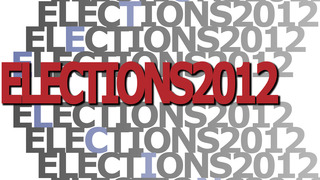
By Amy Goodman with Denis Moynihan
The Republican caucuses in Iowa, with their cliffhanger ending, confirmed two key political points and left a third virtually ignored. First, the Republicans are not enthusiastic about any of their candidates. Second, we have entered a new era in political campaigning in the United States post-Citizens United, the U.S. Supreme Court decision that unleashed a torrent of unreported corporate money into our electoral process. And third, because President Barack Obama is running in this primary season unchallenged, scant attention has been paid to the growing discontent among the very people who put him in office in 2008. As a result, the 2012 presidential election promises to be long, contentious, extremely expensive and perhaps more negative than any in history.
Mitt Romney technically prevailed in the Iowa caucuses, squeaking out an eight-vote margin over late-surging Rick Santorum. Libertarian Ron Paul garnered an impressive 21 percent of the vote in the crowded field. Note that the Republican Party does not allow a recount of the handwritten, hand-counted ballots, and that the final Romney edge was first reported on right-wing Fox News Channel by none other than its paid commentator Karl Rove, the architect of George W. Bush’s two controversial presidential election wins.
So, the prevailing wisdom is that while Willard Mitt Romney retains the veneer of “electability,” he cannot persuade more than 25 percent of Republicans to vote for him. Santorum’s surge was a late-breaking coalescence of the anti-Romney vote, boosted by massive voter flight from Newt Gingrich that was inspired by a withering campaign of anti-Gingrich attack ads attributed to Romney.
While Romney’s Iowa operation maintained a positive campaign strategy, a super PAC that supported him went on the offensive. Restore Our Future, according to NBC’s Michael Isikoff, spent $2.8 million in ads in Iowa, more than twice the amount spent by the Romney campaign itself, all attacking Gingrich. The super PAC is not limited in how much corporate or individual money it can take in, and does not have to disclose the identity of its donors. While super PACs are prevented by law from coordinating with campaigns, three of the founders of the pro-Romney Restore Our Future were campaign staffers on Romney’s failed 2008 presidential bid: Carl Forti, Charlie Spies and Larry McCarthy.
The Iowa caucuses can be seen as the first instance in a presidential electoral race waged after the January 2010 U.S. Supreme Court’s landmark Citizens United v. Federal Election Commission ruling. As summarized by the SCOTUSblog, the split court decided that “political spending is a form of protected speech under the First Amendment, and the government may not keep corporations or unions from spending money to support or denounce individual candidates in elections.”
Election seasons are usually a boon for local TV stations, which sell airtime over the public airwaves. Iowa broadcasters were reporting a less-than-projected windfall, however, due to the record number of candidate debates, in which the candidates got to present themselves to the public, in essence, “for free.” The last-minute onslaught of negative ads brought station revenues back up. Dale Woods, general manager of WHO TV in Des Moines, told Broadcasting & Cable magazine: “It’s normally never negative here, but that’s one dynamic I’ve seen change with the PAC money involved. The candidate buys are positive, but the PAC money is negative. I think that’s a dynamic you’ll see all over the country.”
The advertising industry is watching campaign spending closely, predicting up to $4 billion in spending across all the campaigns, including those for president, Senate, House and governorships.
But there’s hope. People are fighting back against this flood of secret money infecting U.S. elections. State legislators in California are calling for a constitutional amendment overturning Citizens United. The New York City Council is voting on a similar measure, following Los Angeles, Oakland, Calif., Albany, N.Y., and Boulder, Colo. Last week, Montana’s Supreme Court restored a 100-year-old ban on corporate spending directed at political campaigns or candidates.
Harvard law professor Lawrence Lessig is calling for a constitutional convention. As defined in the U.S. Constitution, 34 state legislatures would need to call for a convention, which could allow an amendment banning corporate money from elections. Lessig, a favorite of progressives, is recruiting the right-wing tea party to help. He told me, “People can call for a convention for any purpose … the only option we have for intervening to fix this corrupted system is the only option the framers gave us, which is outsiders organizing to fix the problem in Washington.”
Amy Goodman is the host of “Democracy Now!,” a daily international TV/radio news hour airing on more than 1,000 stations in North America. She is the author of “Breaking the Sound Barrier,” recently released in paperback and now a New York Times best-seller.
© 2011 Amy Goodman











Media Options